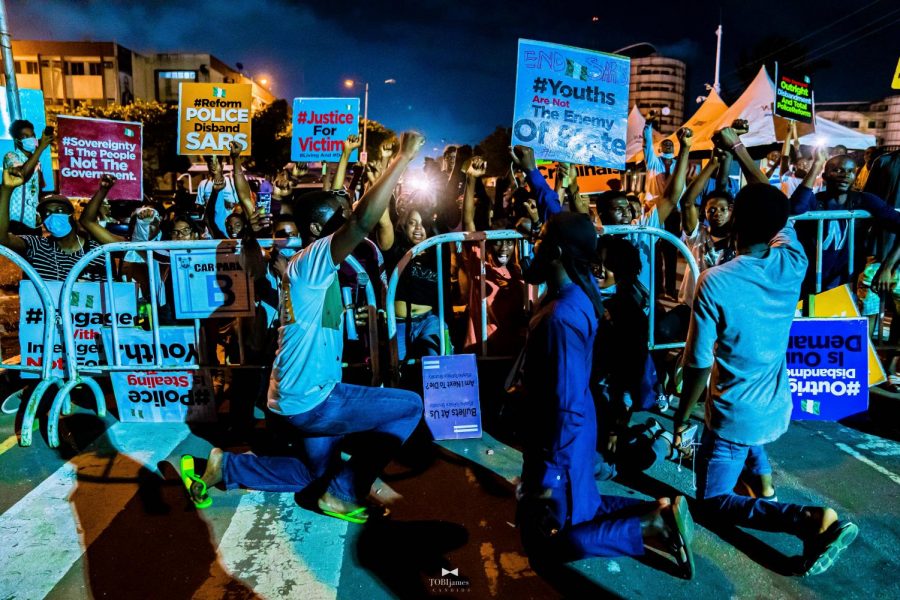Op-ed: Why Americans need to care about global unrest
Protests against police brutality have gripped Nigeria in recent weeks.
November 7, 2020
In the midst of one of the most pressing presidential elections in the United States, it may seem difficult to divert attention away from anything that isn’t about the election. The past few months, however, have made it abundantly clear why Americans must start directing their attention outside of the country.
About two weeks ago, the hashtag #EndSARS trended worldwide on social media. Attached to this hashtag were videos and posts pleading for international attention to turn toward Nigeria. Following the online circulation of a video showing the extrajudicial execution of a Nigerian man by the Special Anti-Robbery Squad, or SARS, the person who took the video was promptly arrested, leading to major protests across Lagos and other Nigerian cities.
The demonstrations called for an end to SARS, a police unit notoriously known for killing and terrorizing everyday youth for simply dressing a certain way or portraying a specific lifestyle. In response, the federal government officially disbanded the unit. Many argue that this response was performative and failed to implement any real change, as the officers were not prosecuted and were merely transferred to other units.
What started as a protest to police brutality morphed into a demand for a re-evaluation of Nigeria’s infrastructure, from an end to governmental corruption to increased funding for public resources. This may seem like a fight reserved for the Nigerian people, but in light of the past few months the United States has endured, it is more than obvious as to why Americans should address these protests with the same concern as they did their demonstrations.
After the murder of George Floyd and Breonna Taylor, the United States endured weeks of civil unrest as people protested police brutality, reviving the Black Lives Matter movement in the process. Though primarily concerned with the issue of policing and racism throughout the United States, the protests extended beyond the country. Worldwide demonstrations took place in support of the American people, with international media widely covering the American people’s struggle towards racial equality. The world supported the American people in their fight, so why shouldn’t Americans do the same?
Several U.S. officials condemned Nigerian officials thus far, and protests — primarily organized by Nigerian Americans — have taken place in a few American cities, but for a large percentage of the domestic population it seems as though the issue is not a priority. Looking at the past decade or two, I noticed a trend that much of the American public seems to ignore or only graze upon issues that don’t directly affect their country. Humanitarian crises in Yemen or Afghanistan are a couple of places that come to mind when thinking of countries the United States intervened in and left worse off, while little concern is raised within the United States aside from communities directly affected. While this can be seen as a prioritization of issues directly affecting an individual, it often reflects an ignorance toward events happening in the rest of the world.
Growing up in a multicultural household, I see this pattern in my own life through the interactions I have had with friends and family abroad versus here in the United States. Americans tend to pay only a small amount of attention to global events like tensions in Syria or unrest in Hong Kong before quickly moving onto the passing of a new Congressional bill or the latest presidential act.
National issues should in no way be belittled. However, it’s time Americans widened their scope of involvement to include the rest of the world in their considerations, just like the world has been doing for them for years.
Zeynep Tuncer is a second-year business administration major. She can be reached at [email protected].


















